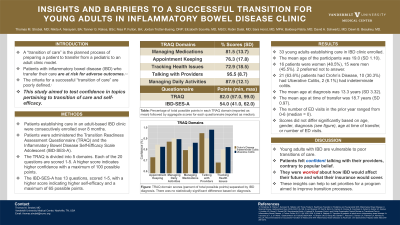Tuesday Poster Session
Category: IBD
P3543 - Insights and Barriers to a Successful Transition for Young Adults in Inflammatory Bowel Disease Clinic
Tuesday, October 24, 2023
10:30 AM - 4:00 PM PT
Location: Exhibit Hall

Has Audio

Thomas M. Strobel, MD
Vanderbilt University Medical Center
Nashville, TN
Presenting Author(s)
Thomas M. Strobel, MD1, Nikita A. Narayani, BA1, Tanner G. Rakos, BSc1, Nisa P. Fulton, BA1, Jordan Trotter-Busing, MSN, RN, CPNP2, Elizabeth Scoville, MD, MSCI1, Robin Dalal, MD1, Sara Horst, MD, MPH1, Baldeep Pabla, MD1, David Schwartz, MD3, Dawn Borromeo Beaulieu, MD1
1Vanderbilt University Medical Center, Nashville, TN; 2Monroe Carell Jr. Children's Hospital at Vanderbilt, Nashville, TN; 3Vanderbilt University Medical Center, Brentwood, TN
Introduction: A transition of care is the planned transfer of care from a pediatric GI specialist to adult providers. Preparation is needed since pediatric and adult providers have different models of care. This is especially true in the field of Inflammatory Bowel Disease (IBD). A clear definition of readiness has yet to be decided. In this study, the Transition Readiness Assessment Questionnaire (TRAQ) and the Inflammatory Bowel Disease Self Efficacy Scale – Adolescent (IBD-SES-A) were used to assess aspects of transition readiness in patients with IBD.
Methods: From October 2022 through May 2023, young adults transferring from pediatric GI to adult IBD clinic were consecutively enrolled. Patients were administered the TRAQ and IBD-SES-A. The TRAQ was divided into 5 domains: Managing Medications, Appointment Keeping, Tracking Health Issues, Talking with Providers, and Managing Daily Activities. IBD diagnosis, age at diagnosis, and number of emergency room visits during the previous year were collected.
Results: 33 patients enrolled. The mean age was 19. 16 (48.5%) were female. 21 patients had Crohn’s Disease, 10 had Ulcerative Colitis, and 2 had Indeterminate Colitis. The mean age at diagnosis was 13. The mean age at time of transfer was 19. The number of ED visits in the prior year ranged from 0 to 6. Topics with highest confidence included knowing what IBD was, what a colonoscopy was for, and answering questions asked by their providers. Topics with lowest confidence included worrying about IBD affecting their future, taking medications, knowing what insurance covered, and keeping a list of questions. The TRAQ domain with highest confidence was “Talking with Providers” while the domains with lowest confidence were “Tracking Health Issues” and “Appointment Keeping”.
Discussion: Patients with IBD are vulnerable to poor transitions due to the complexity of their management. Pediatric models focus on family units and account for psychosocial stages of child development. Adult models are patient-centered and promote autonomy. Patients in this study felt confident talking with providers, contrary to common belief. They worried about how their disease may affect their future and what insurance would cover. This cohort may have performed better due to most having a dedicated transition visit at the tertiary care center prior to transfer. This study highlights the utility of measuring transition readiness and provides potential targets to improve transition programs.

Disclosures:
Thomas M. Strobel, MD1, Nikita A. Narayani, BA1, Tanner G. Rakos, BSc1, Nisa P. Fulton, BA1, Jordan Trotter-Busing, MSN, RN, CPNP2, Elizabeth Scoville, MD, MSCI1, Robin Dalal, MD1, Sara Horst, MD, MPH1, Baldeep Pabla, MD1, David Schwartz, MD3, Dawn Borromeo Beaulieu, MD1. P3543 - Insights and Barriers to a Successful Transition for Young Adults in Inflammatory Bowel Disease Clinic, ACG 2023 Annual Scientific Meeting Abstracts. Vancouver, BC, Canada: American College of Gastroenterology.
1Vanderbilt University Medical Center, Nashville, TN; 2Monroe Carell Jr. Children's Hospital at Vanderbilt, Nashville, TN; 3Vanderbilt University Medical Center, Brentwood, TN
Introduction: A transition of care is the planned transfer of care from a pediatric GI specialist to adult providers. Preparation is needed since pediatric and adult providers have different models of care. This is especially true in the field of Inflammatory Bowel Disease (IBD). A clear definition of readiness has yet to be decided. In this study, the Transition Readiness Assessment Questionnaire (TRAQ) and the Inflammatory Bowel Disease Self Efficacy Scale – Adolescent (IBD-SES-A) were used to assess aspects of transition readiness in patients with IBD.
Methods: From October 2022 through May 2023, young adults transferring from pediatric GI to adult IBD clinic were consecutively enrolled. Patients were administered the TRAQ and IBD-SES-A. The TRAQ was divided into 5 domains: Managing Medications, Appointment Keeping, Tracking Health Issues, Talking with Providers, and Managing Daily Activities. IBD diagnosis, age at diagnosis, and number of emergency room visits during the previous year were collected.
Results: 33 patients enrolled. The mean age was 19. 16 (48.5%) were female. 21 patients had Crohn’s Disease, 10 had Ulcerative Colitis, and 2 had Indeterminate Colitis. The mean age at diagnosis was 13. The mean age at time of transfer was 19. The number of ED visits in the prior year ranged from 0 to 6. Topics with highest confidence included knowing what IBD was, what a colonoscopy was for, and answering questions asked by their providers. Topics with lowest confidence included worrying about IBD affecting their future, taking medications, knowing what insurance covered, and keeping a list of questions. The TRAQ domain with highest confidence was “Talking with Providers” while the domains with lowest confidence were “Tracking Health Issues” and “Appointment Keeping”.
Discussion: Patients with IBD are vulnerable to poor transitions due to the complexity of their management. Pediatric models focus on family units and account for psychosocial stages of child development. Adult models are patient-centered and promote autonomy. Patients in this study felt confident talking with providers, contrary to common belief. They worried about how their disease may affect their future and what insurance would cover. This cohort may have performed better due to most having a dedicated transition visit at the tertiary care center prior to transfer. This study highlights the utility of measuring transition readiness and provides potential targets to improve transition programs.

Figure: Confidence in each Transition Readiness Assessment Questionnaire domain defined as total scores divided by total possible points and separated by diagnosis.
Disclosures:
Thomas Strobel indicated no relevant financial relationships.
Nikita Narayani indicated no relevant financial relationships.
Tanner Rakos indicated no relevant financial relationships.
Nisa Fulton indicated no relevant financial relationships.
Jordan Trotter-Busing indicated no relevant financial relationships.
Elizabeth Scoville indicated no relevant financial relationships.
Robin Dalal indicated no relevant financial relationships.
Sara Horst: Abbvie – Advisory Committee/Board Member, Consultant. Gilead – Advisory Committee/Board Member, Consultant. Janssen – Advisory Committee/Board Member, Consultant. Takeda – Advisory Committee/Board Member, Consultant. USB – Advisory Committee/Board Member, Consultant.
Baldeep Pabla indicated no relevant financial relationships.
David Schwartz: AbbVie – Advisory Committee/Board Member, Consultant. Genetech – Advisory Committee/Board Member, Consultant. Gilead – Advisory Committee/Board Member, Consultant. Janssen – Advisory Committee/Board Member, Consultant. Pfizer – Advisory Committee/Board Member, Consultant. Takeda – Advisory Committee/Board Member, Consultant. UCB – Advisory Committee/Board Member, Consultant.
Dawn Borromeo Beaulieu: AbbVie – Advisory Committee/Board Member, Consultant. AndHealth – Consultant. Takeda – Advisory Committee/Board Member, Consultant.
Thomas M. Strobel, MD1, Nikita A. Narayani, BA1, Tanner G. Rakos, BSc1, Nisa P. Fulton, BA1, Jordan Trotter-Busing, MSN, RN, CPNP2, Elizabeth Scoville, MD, MSCI1, Robin Dalal, MD1, Sara Horst, MD, MPH1, Baldeep Pabla, MD1, David Schwartz, MD3, Dawn Borromeo Beaulieu, MD1. P3543 - Insights and Barriers to a Successful Transition for Young Adults in Inflammatory Bowel Disease Clinic, ACG 2023 Annual Scientific Meeting Abstracts. Vancouver, BC, Canada: American College of Gastroenterology.
